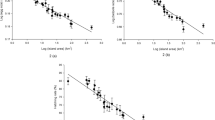Abstract
THE difficulty of raising leopard frogs, Rana pipiens, to maturity in controlled conditions makes them impractical for many experiments1. Tadpoles have previously died soon after metamorphosis2, but we have now raised frogs to sexual maturity with a low mortality rate. Thus sibling adults can be used for experimental purposes, and using our methods (described here) it should be possible to carry out genetic studies over several generations and to develop partially inbred lines of these laboratory animals.
This is a preview of subscription content, access via your institution
Access options
Subscribe to this journal
Receive 51 print issues and online access
$199.00 per year
only $3.90 per issue
Buy this article
- Purchase on Springer Link
- Instant access to full article PDF
Prices may be subject to local taxes which are calculated during checkout
Similar content being viewed by others
References
Volpe, E. P., J. Heredity, 47, 79 (1956).
Anderson, S. C., and Volpe, E. P., Science, 127, 1048 (1958).
Author information
Authors and Affiliations
Rights and permissions
About this article
Cite this article
CAIRNS, A., BOCK, J. & BOCK, F. Leopard Frogs raised in Partially Controlled Conditions. Nature 213, 191–193 (1967). https://doi.org/10.1038/213191a0
Received:
Issue Date:
DOI: https://doi.org/10.1038/213191a0
Comments
By submitting a comment you agree to abide by our Terms and Community Guidelines. If you find something abusive or that does not comply with our terms or guidelines please flag it as inappropriate.



